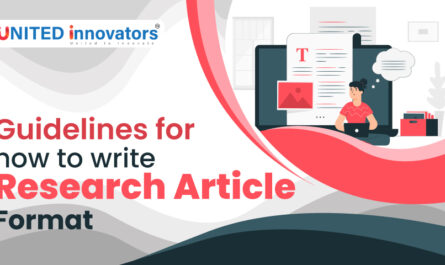It is vital for researchers, scientists, scholars, and academics to understand the various formats of articles published in high-level scientific journals because the format of an article provides crucial information about the nature and purpose of the research being reported. Understanding the different formats, such as research articles, review articles, case studies, letters to the editor, and methodology articles, helps researchers and academics to critically evaluate and interpret the results and implications of the research being reported. This understanding also enables researchers to communicate their own findings in the most appropriate format and to contribute to the ongoing scientific discourse in their field. By understanding the different formats of articles published in scientific journals, researchers can improve the quality and impact of their research and support the advancement of their field.
- The Review Article Format
- Review articles in scientific journals play a crucial role in disseminating information and summarizing the current state of research in a particular field.
- They are an invaluable source of data for researchers, practitioners, and the general public.
- Review articles differ from original research articles in several ways, and it is important to understand these differences to fully appreciate their value.
- Overview Of A Field
- Review articles provide an overview of the present state of research in a particular field.
- They summarize the findings of multiple studies, synthesize the data, and provide a comprehensive picture of the current understanding of a topic.
- This makes them useful for researchers who are new to a field and want to quickly acquire an understanding of the present state of knowledge.
- Synthesis Of Findings
- Review articles synthesize the findings of multiple studies on a particular topic, highlighting similarities and differences in results.
- This allows the authors to identify gaps in the current understanding of a topic and suggest areas for future research.
- Review articles also provide a critical assessment of the strengths and weaknesses of existing research, and help to identify areas where further investigation is needed.
- Current Trends & Developments
- Review articles highlight current trends and developments in a field and provide a context for interpreting new research findings.
- They can also provide a historical perspective on the development of a field and help to identify important discoveries and contributions that have shaped the current understanding of a topic.
- Summary Of Methods & Techniques
- Review articles often provide a summary of the methods and techniques used in the studies they review.
- This can be particularly useful for researchers who are new to a field, as it provides a concise overview of the methods used in the field and helps them understand the strengths and limitations of these methods.
- Recommendations For Future Research
- Review articles often provide recommendations for future research based on their analysis of the current state of research in a field.
- These recommendations can help to guide future research efforts and ensure that new studies build on existing knowledge and address important gaps in the current understanding of a topic.
- The Case Study Format
- Case studies are a popular form of scientific research that involve the detailed examination of either an isolated case or a group of similar cases.
- They are widely used in fields such as medicine, psychology, sociology, and education to gain a deeper understanding of a particular phenomenon or issue.
- Case studies can provide valuable insights that may not be evident in larger, more general studies, and they play an important role in advancing our understanding of complex issues and problems.
- In-Depth Examination
- Case studies involve an in-depth examination of a single case or a small number of cases.
- This allows for a detailed and nuanced understanding of a particular phenomenon or issue and provides a rich source of data that can be used to develop theories and explanations.
- Holistic Approach
- Case studies take a holistic approach to understanding a particular issue or phenomenon.
- They consider multiple perspectives and factors that may be relevant and examine how these interact to influence the case at hand.
- This holistic approach allows for a more complete understanding of the case and can help to identify important causal relationships and patterns.
- Real-World Context
- Case studies take place in real-world contexts, which provides a valuable source of information about the practical implications of a particular issue or phenomenon.
- This information can be used to inform policy and practice and can help to develop more effective interventions and solutions.
- Flexibility
- Case studies are flexible and can be adapted to meet the specific research questions and goals of the researcher.
- They can be used to examine a wide range of phenomena, from individual experiences to organizational processes, and can be adapted to meet the needs of different disciplines and fields.
- Triangulation Of Data
- Case studies often involve the collection and analysis of multiple types of data, such as qualitative interviews, observational data, and archival records.
- This triangulation of data allows for a more comprehensive understanding of the case and helps to amplify the validity and trustworthiness of the discoveries.
- The Letters To The Editor Format
- Letters to the editor are a common form of communication in scientific journals and serve as a forum for researchers and practitioners to share their thoughts and opinions on recent research findings and developments.
- Letters to the editor are typically brief, focused comments that provide a platform for readers to engage with the scientific community and to contribute to the ongoing discussion of important topics.
- Brief & Focused
- Letters to the editor are typically brief and are intended to provide a focused and concise comment on a recent publication or issue.
- This format allows for a rapid response to recent developments in a field and provides a platform for researchers and practitioners to disseminate their expertise and opinions in a timely manner.
- Discussion Of Recent Research
- Letters to the editor often address recent research findings and provide a platform for readers to engage with the scientific community and to take part in the ongoing discussion of important topics.
- This allows for a more open and inclusive dialogue and provides an opportunity for researchers to share their perspectives and to offer alternative interpretations of research findings.
- Feedback & Correction
- Letters to the editor can also serve as a platform for feedback and correction and provide a means for researchers and practitioners to share their concerns about errors or omissions in recent publications.
- This helps to ensure the accuracy and reliability of scientific information and supports the scientific community in maintaining high standards of quality and integrity.
- Opportunity For Further Discussion
- Letters to the editor provide an opportunity for further discussion and exploration of important topics and can help to stimulate new lines of inquiry and research.
- This allows for a more collaborative and interdisciplinary approach to scientific inquiry and helps to advance our understanding of complex issues and problems.
- Public Engagement
- Letters to the editor provide a means for the public to engage with the scientific community and to learn about recent research findings and developments.
- This helps to increase the accessibility and visibility of scientific information and supports efforts to promote public engagement with science and to increase public understanding of important scientific topics.
- The Methodology Article Format
- Methodology articles are a type of scientific research article that focuses on the methods used to conduct a study or experiment.
- These articles provide detailed information about the design, implementation, and analysis of a study and play an important role in advancing the field by providing other researchers with the tools and techniques they need to replicate and build upon previous research.
- Detailed Methodology
- Methodology articles provide a detailed description of the methods used to conduct a study or experiment.
- This includes information about the study design, sample selection, data collection methods, and statistical analysis techniques.
- This information is critical for other researchers who wish to replicate the study or build upon its findings and is an essential component of scientific transparency and reproducibility.
- Standardization Of Methods
- Methodology articles play an important role in standardizing methods used in a particular field or discipline.
- By sharing information about the methods used in a study, researchers can ensure that similar studies are conducted using consistent and comparable methods, which assists in increasing the reliability and validity of results.
- Advancement Of Methods
- Methodology articles also provide an opportunity for researchers to share and advance new and innovative methods.
- By sharing their methods and findings, researchers can contribute to the advancement of novel techniques and tools that can be made use of to enhance the accuracy and efficiency of research in their field.
- Evaluation Of Methods
- Methodology articles provide an opportunity to evaluate the methods used in a study and to assess their strengths and limitations.
- This helps to identify areas for improvement and to develop new methods that can be used to address the limitations of existing methods.
- Replication Of Results
- Methodology articles also provide a means for other researchers to replicate the results of a study, which helps to increase the reliability and validity of the findings.
- By providing detailed information about the methods used in a study, researchers can help other researchers to repeat the study, test the validity of the results, and build upon the findings.




